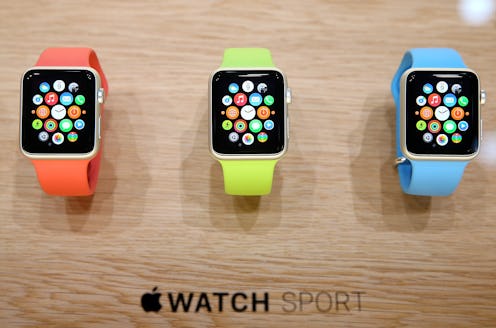Life
Do Wearable Fitness Monitors Really Work?
Wearable fitness monitors aren't quite as ubiquitous as smartphones, but they're getting there — and as the Apple Watch promises to revolutionize your workouts, fitness monitoring may soon become mainstream in the same way the iPhone took the smartphone to the masses. But do wearable health monitors actually improve your health? It was just a matter of time before researchers started studying whether the supposed benefits of fitness monitors are legitimate, and what they found might (pleasantly) surprise you: Preliminary results suggest that wearable health monitors provide health support that can be comparable to professional advice — with a few caveats.
Faculty at the University of Texas Medical Branch at Galveston systematically analyzed 13 wearable fitness monitors (including models from Basis, BodyMedia, Misfit, Fitbug, Ibitz, Polar and Withings) to see how they stacked up against advice you might receive from a healthcare professional. According to Medical News Today, they found:
most of the goal-setting, self-monitoring and feedback tools in the apps bundled with the devices were consistent with the recommendations health care professionals make for their patients when promoting increase in physical activity.
The devices generally include a pedometer function and keep records of what type of physical activity takes place, users' heart rate history, sleep quality patterns, and temperature fluctuations. In the era of the "quantified self," what doctor are you going to get to do all of that for you day in and day out, at an affordable price?
Still, some skepticism is in order. While it's good that fitness monitors aren't actively contradicting the advice of physicians, it's a low bar for saying that they make a good replacement for actual professional advice. Information from a doctor, conveyed in conversation, may be in some ways better than a monitor (for one thing, you can ask your doctor followup questions). As researchers note, the wearable fitness monitors don't show novice users how to do fitness activities in the first place, and do little in the way of actual problem solving. A wearable fitness monitor may have more capabilities than a doctor when it comes to gathering and reporting raw data about your body, but a certain amount of nuanced, human interpretation will almost certainly remain necessary.
You can be sure that this won't stop the manufacturers of wearable fitness monitors from overselling them, though. People who find themselves under-motivated, fitness-wise make prime customers. It's fun to think that a glitzy tech toy is all that's needed to regain control over your health, but the reality is that it's going to take more than gadgets to establish healthy behavior.
It's important to keep in mind that a fitness monitor is only as good as its wearer is conscientious. The health benefits of currently available wearable monitors have been scientifically established, but while products like the Apple Watch may seem beautiful and intuitive, they aren't the must-have ticket to health and happiness.
